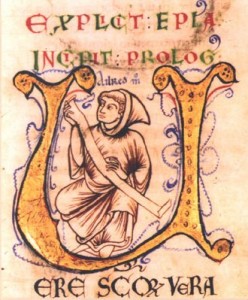 “ONE thing thou lackest.” In these words God called Aelred from the court of a royal Saint, David of Scotland, to the silence of the cloister. He left the king, the companions of his youth, and a friend most dear, to obey the call. The conviction that in the world his soul was in danger alone enabled him to break such ties. Long afterwards the bitterness of the parting remained fresh in his soul, and he declared that, “though he had left his dear ones in the body to serve his Lord, his heart was ever with them.”
“ONE thing thou lackest.” In these words God called Aelred from the court of a royal Saint, David of Scotland, to the silence of the cloister. He left the king, the companions of his youth, and a friend most dear, to obey the call. The conviction that in the world his soul was in danger alone enabled him to break such ties. Long afterwards the bitterness of the parting remained fresh in his soul, and he declared that, “though he had left his dear ones in the body to serve his Lord, his heart was ever with them.”
He entered the Cistercian Order, and even there his yearning for sympathy showed itself in a special attraction to one among the brethren named Simon. This holy monk had left the world in his youth, and appeared as one deaf and dumb, so absorbed was he in God. One day Aelred, forgetting for the moment the rule of perpetual silence, spoke to him. At once he prostrated himself at his feet in token of his fault; but Simon’s look of pain and displeasure haunted him for many a year, and taught him to let no human feeling disturb for one moment his union with God.
A certain novice once came to Aelred, saying that he must return to the world. But Aelred had begged his soul of God, and answered, “Brother, ruin not thyself; nevertheless thou canst not, even though thou wouldst.” However, he would not listen, and wandered among the hills, thinking all the while he was going far from the abbey. At sunset he found himself before a convent strangely like Rieveaux, and so it was. The first monk he met was Aelred, who fell on his neck, saying, “Son, why hast thou done so with me? Lo! I have wept for thee with many tears, and I trust in God that, as I have asked of Him, thou shalt not perish.” The world does not so love its friends.
At the command of his superiors Aelred composed his great works, the Spiritual Friendship and the Mirror of Charity. In the latter he says that true love of God is only to be obtained by joining ourselves in all things to the Passion of Christ. He died in 1167, founder and Abbot of Rieveaux, the most austere monastery in England, and Superior of some three hundred monks.
Reflection.—When a man has given himself to God, God gives back friendship with all His other gifts a hundredfold. Friends are then loved no longer for themselves only, but for God, and that with a love lively and tender; for God can easily purify feeling. It is not feeling, but self-love, which corrupts friendship.


